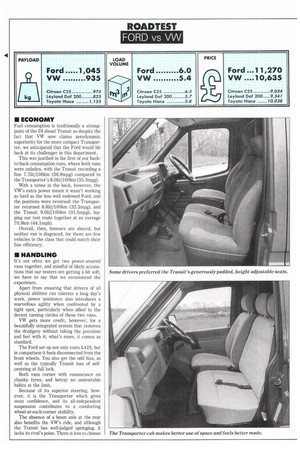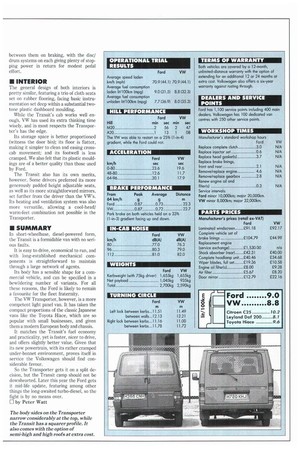• ECONOMY
Page 34

Page 35

If you've noticed an error in this article please click here to report it so we can fix it.
Fuel consumption is traditionally a strongpoint of the DI diesel Transit so despite the fact that VW now claims aerodynamic superiority for the more compact Transporter, we anticipated that the Ford would hit back at its challenger in this department.
This was justified in the first of our backto-back consumption runs, where both vans were unladen, with the Transit recording a fine 7.7lit/100Iun (36.9mpg) compared to the Transporter's 8.01it/1001un (35.3mpg).
With a tonne in the back, however, the VW's extra power meant it wasn't working as hard as the less well endowed Ford, and the positions were reversed: the Transporter returned 8.81it/100Iun (32.3mpg), and the Transit 9.01if/100km (31.5mpg), lapping our test route together at an average 70.9km (44.1mph).
Overall, then, honours are shared, but neither van is disgraced, for there are few vehicles in the class that could match their fine efficiency.
• HANDLING
It's not often we get two power-steered vans together, and mindful of likely accusations that our testers are getting a bit soft, we have to say that we recommend the experience.
Apart from ensuring that drivers of all physical abilities can tolerate a long day's work, power assistance also introduces a marvellous agility when confronted by a tight spot, particularly when allied to the decent turning circles of these two vans.
VW gets more credit, however, for a beautifully integrated system that removes the drudgery without taking the precision and feel with it; what's more, it comes as standard.
The Ford set-up not only costs £425, but in comparison it feels disconnected from the front wheels. You also get the odd hiss, as well as the typically Transit loss of selfcentring at full lock.
Both vans corner with reassurance on chunky tyres, and betray no undesirable habits at the limit.
Because of its superior steering, however, it is the Transporter which gives most confidence, and its all-independent suspension contributes to a comforting wheel-at-each-corner stability.
The absence of a beam axle at the rear also benefits the VW's ride, and although the Transit has well-judged springing, it lacks its rival's poise. There is less to choose between them on braking, with the disc/ drum systems on each giving plenty of stopping power in return for modest pedal effort.
• INTERIOR
The general design of both interiors is pretty similar, featuring a trio of cloth seats set on rubber flooring, facing basic instrumentation set deep within a substantial twotone plastic dashboard moulding.
While the Transit's cab works well enough, VW has used its extra thinking time wisely, and in most respects the Transporter's has the edge.
Its storage space is better proportioned (witness the door bin); its floor is flatter, making it simpler to clean and easing crosscab movement; and its footwell is less cramped. We also felt that its plastic mouldings are of a better quality than those used by Ford.
The Transit also has its own merits, however. Some drivers preferred its more generously padded height adjustable seats, as well as its more straightforward mirrors, set further from the driver than the VW's. Its heating and ventilation system was also more versatile, allowing a cool-head/ warm-feet combination not possible in the Transporter.
• SUMMARY
In short-wheelbase, diesel-powered form, the Transit is a formidable van with no serious faults.
It is easy to drive, economical to run, and with long-established mechanical components is straightforward to maintain through a large network of agents.
Its body has a sensible shape for a commercial vehicle, and can be specified in a bewildering number of variants. For all these reasons, the Ford is likely to remain a favourite for the fleet fraternity.
The VW Transporter, however, is a more competent light panel van. It has taken the compact proportions of the classic Japanese vans like the Toyota Hiace, which are so popular with small businesses, and given them a modern European body and chassis.
It matches the Transit's fuel economy and practicality, yet is faster, nicer to drive, and offers slightly better value. Given that its new powertrain, with its rather cramped under-bonnet environment, proves itself in service the Volkswagen should find considerable favour.
So the Transporter gets it on a split decision, but the Transit camp should not be downhearted. Later this year the Ford gets it mid-life update, featuring among other things the long-awaited turbo-diesel, so the fight is by no means over.
CI by Peter Watt




















































































